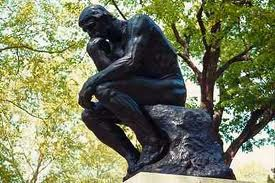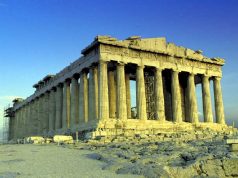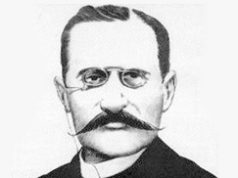To know how to ‘philosophise’ we need to learn the science of going deep into ourselves.”(J.H.Pires)
The Gospel is the Code of the second Christian revelation that shines over the center of the triad of these revelations, with the image of Jesus of Nazareth as a sun, whose light shines over them, over the past and the future, and establishes the necessary connection between both. But just as in the Bible, the Gospel has already been announced, the prediction of a new code also appeared, the Spirit of Truth, as seen in John, chapter 14. And the new code came with Allan Kardec under the guidance of the Spirit of Truth, exactly when the world was preparing to enter a higher stage of moral development. (…) (J.H. Pires)
There is a great importance in the practical meaning of philosophy and spiritist philosophy as they stimulate serious and careful thoughts to bring self-knowledge and great opportunities to understand the most important human and spiritualist questions. If we think about philosophy just as a disposition to think, we will reduce its importance in the context of human history. With philosophy, we learn to consider the elements that make up the existence of being-in-the-world, since we own an innate existential anxiety. The spiritist philosophy extends this search and reveals the existence of the interbeing in temporal, evolutive infinite dimensions expressing its lights or shadows in the forms concerning to its level of consciousness.
Philosophy seeks answers, rises, develops, reflects, retakes to reconsider the previous answers. It does not conclude, just leads you. And it is during this journey that we discover to be in constant and infinite search of ourselves. Hamlet, Shakespeare’s character, opposite the mirror and with his jester’s remains, opens the perspective of nothing, a distressing, confusing and overwhelming emptiness that takes us by surprise before the silence of the death. The big question, he says, is to be or not to be. Is this (the remains) what we become?
Existentialism – or the anguish to exist – has urged man to be fully “here” and “now” to accept his intense “human reality” of the moment – the future is nothing more than visions and illusions to give to our present direction and purpose. “One hundred years after Kardec, the philosophy in France almost fell apart in the sophism of nothing, with Jean Paul Sartre and his school. But Simone de Beauvoir, Sartre’s companion and disciple, confirms and illustrates Kardec’ s considerations, writing: ‘… I hate to think of my annihilation. I think about the books I read, places visited, and the accumulated knowledge that no longer will exist inLa Force.(…)’, des Choses. “The approach of death, under the idea of nothing, brings the most cultured creatures bitter hopelessness. (Pires, JH). ”
It is under this distressing perspective that human intelligence has sought to minimize the undeniable and irrefutable reality of death. The Thinker (Le Penseur) is one of the most famous bronze sculptures of French sculptor Auguste Rodin. It depicts a man in deep meditation, in a gesture of one who is fighting with a powerful internal struggle. He became the archetype of philosophical inquiry as a quest for himself.
All those who have managed to overcome the surface of existence as forms of enjoyment, even as they carry in themselves a sign of their inherent fragility, they identify with that figure. The Thinker (see above) brings the anguish of the form torn by grief; almost deformed, disproportionate, conveys the intense inner drama that is the bearer. His frowning, his gaze remains hidden face down. He does not seek answers in the sky above his thought, but in the earth beneath his feet. He did not demonstrate a serene thought, but plagued with a lack of responses. He is naked. Abandoned or deprived of illusions that could hide his own reality, he exposes himself. And leaves one of the most eloquent messages to the human being now: the true reality of being does not lie here, in the perishable temporality, but the immortality of the one who thinks: the Spirit.
He is naked. Abandoned or deprived of illusions that could hide his own reality, he exposes himself. And leaves one of the most eloquent messages to the human being now: the true reality of being does not lie here, in the perishable temporality, but the immortality of the one who thinks: the Spirit.
Other authors whose works are now on the screens, use human senses (Babel, Blindness), for a new dive within, through the sensitive world, seeking to bring out their personal tragedies projecting them to their similar in a cathartic movement in search of identification.
In 25 centuries of philosophy, we have innumerable contradictory doctrines. None of the western thinkers were in agreement regarding their proposals. There is a deep dissatisfaction generated by the lack of agreement. The ultimate goal should be fulfilment but who accomplished it so far?
We praise those who tried. His efforts have immortalized the history of the human spirit in its infinite journey through self-knowledge. Even those, who got lost in the void themselves. So they did, because of the absolute necessity of identifying with each other, and all with God.
“God is dead,” Nietzsche said once. The god presented by the religions is dead. He died for lack of mercy and love of neighbour. He died by suffocation after falling into the millions of coins generated from the criminal obtained by naivety and lack of knowledge. He died in each empty ritual of answers, which perpetuates the belief that the crucifixion is our liberation (!?).
He died in each maimed or killed being by stray bullets or bombs strapped to his own heart of the one who searches Him in despair. He died in each fallen tree, in every polluted river in the super-heating of the air we breathe. Dead yet,by the lack of kindness, cordiality and mutual respect among those, who call themselves his followers.
Herculano coined the phrase “agony of religions” (Pires, JH), to better define the process of transmutation of ostentation for internalisation. Boasts of faith to self assert itself. To perpetuate the olympic representation of human god on Earth, in the figure of those who insist on represent him.
God has no representatives. He has children and the biggest one was disfigured by the archetypal human psyche, making of his actions and projections of a mythological hero, the son of a god with a mortal, and therefore bearer of miraculous virtues and spectacular mix of hero-martyr-warrior who came to deliver us from Evil, also designed in the archetypal figure of the fallen angel who persists in tormenting human beings with diseases and plagues, which arises between us, one of the most serious moments of our evolution.
He reborn in the spiritist doctrine, just as simple as it came in person in the manger of light. Jesus is transformed into a complete Being, one with the Father because he identifies himself with His laws, in His dilated consciousness by accepted Love because it is understood.
In the format of Philosophy, Spiritualism synthesizes the human efforts in search of self, illustrated by the image of The Thinker. As Philosophy, analyses the elements that make up the existence of the human being in the world, however, adding a great journey that awaits him on the timeline, out of this world too.
The human being is – he/she could never “not to be”. Kierkegaard, Nietzsche and Sartre’s existentialism, served as a pulsing red light, as if to say: wake up! The beauvoiriana anguish in the face of potential losses of its intellectual treasures with the unmistakable appeal of death, remains in the hearts of mothers and fathers who lost their teens because of drugs, alcohol, crime, or sexuality in pathological derangement.
The hopelessness generated by the “scandal” has its solace in the philosophy of the High Spirits; Socrates came first, with his loving experience with ethics-moral founded on the logic and undeniable truth. Plato, with the reality of the world of the ideas that lay covered up deep in the cave. Aristotle, with the immediacy of the world of forms to sketch out the persona and his/her achievements.
The Spiritist Philosophy is not a mere instrument for lucubration. Not even the ostentation before the human and worldly trophies. It is rather an alternative, an invitation (for now) to change the current system of thinking. The spiritist philosophy thinking and spiritualist provides a universe of self-discovery, however, this process requires the recognition of God’s presence in us through His laws, which guide our logic, our development, our evolution, our affections. The Moral Laws didactically determined by spirits to Kardec, represent part of the process of awareness and recognition of the divine in us.
Non-being is the rant mentioned above, non-being makes up the dull feeling that isolate us from each other: envy, pride, arrogance. These elements are powerful in their ability and self-destructive hallo, makes the being to stagnate in his/her existence and show the necessity of suffering to awake. Such journey is not over. Jesus’ example remains as a subliminal image-message to permeate our existential moment. His appeal is still beating in the human hearts. The reading of this call has been decoded wrongly. But he is still there. And when the being gets saturated for not being, will open his/her heart and mind for the banquet – not platonic, as a representation of the sensitive, but the intelligible, since it is full of joy, hope and identification with God.
(Sonia Theodoro da Silva-São Paulo-SP-Brazil)
…………………………………







